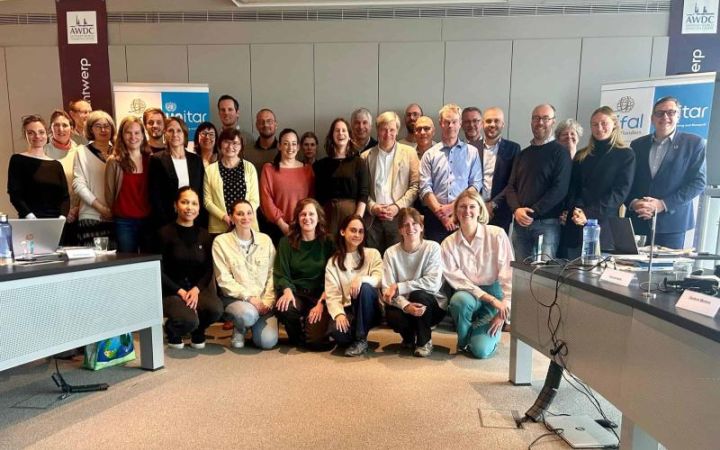Across Australia and Europe, a fresh approach is long overdue when it comes to the debates and policy about refugees and asylum seekers.
Governments and the media must stop presenting policy and analysis about people seeking refugee protection in ways that undermine their personhood – and instead lead discussions that are transparent, principled and accurate.
Our new policy report, Combatting Corrosive Narratives about Refugees, makes the case that governments, political parties and the media should refuse to engage in harmful narratives – most often negative stereotypes – that often fail to comprehend asylum.
In many instances, they intentionally inflame debates about refugee movement and often fail to communicate directly with people seeking refuge.
There’s considerable evidence that the voices of those seeking refuge are often unheard, deliberately silenced or have been manipulated in ways that diminish their personhood.
When they are heard, they are, at best, mediated by others – including by those who support them – who listen and observe from a distance. But in many instances, refugees remain neither seen, nor heard, at all.
This is not to say that the voices of refugees are always absent: rather, there is a failure to listen with care in politics and the media. But listening to these voices is critical in order to fully resist injustices enacted at the border.
Instead, their stories are distorted or even erased by media and by political debates that frame them either as vulnerable victims or as undeserving criminals.
These inaccurate depictions lead to the erosion of human rights and to the legitimation of violence.
There also needs to be caution around those humanitarian narratives that may unintentionally undermine the experiences of people seeking refuge or mask the specificity of each person’s experience.
There’s a danger in using emotive language that reduces those seeking refuge to the figure of the ‘victim’. Asylum seekers have often reflected on the harm that is done by these narratives: by constructing people as little more than a victim, there’s a tendency towards pity that draws on a public imagery of the ‘benevolent’ state as a ‘saviour’.
At the same time, constructing them as a threat is equally harmful – and politicians must avoid this.
There’s a need for context and rationale that fosters a humane and sincere approach to narratives about people seeking asylum and refugees.
We propose achievable recommendations that support a shift away from corrosive narratives, and, in so doing, challenge the harsh policies enabled by harmful and often untruthful representations of refugees.
In sustaining the border as a site that can only be crossed by those deemed worthy to do so, some sections of the media participate in – or fail to challenge – inaccurate depictions by governments of refugees.
This contributes to the dilution of responsibility by governments and the European Union (EU) under the Refugee Convention, as well as to the reinforcement and militarisation of the border.
It’s imperative to challenge the myths underlying corrosive narratives.
In failing to hold governments to account, there’s an acceptance, without adequate questioning – or indeed any questioning at all – of the rhetoric of governments and their mistruths.
In many cases, negative and misleading narratives with minimal or no effort devoted to fact-checking have been circulated.
In this respect, the media’s historical role as the Fourth Estate – providing independent oversight of government – has not only been diminished but degraded. Despite this, some journalists persist in seeking to report on the hardship experiences by those seeking refuge.
But when these reporters seek access to more information – as we’ve seen in Australia’s offshore detention centres and within detention centres in Libya that are financed by the EU – they have often been denied that access, with considerable restrictions placed on them by states that are signatories to the Refugee Convention.
Now is the time for policymakers, politicians, the media and civil society to reflect on the need for states and regional bodies (like the EU) to counter corrosive narratives and policies.
But it is the politicians who enact policies, making legislation that is harmful and that presents corrosive narratives and tropes to the public, the media, parliaments and to refugees themselves.
The responsibility lies with governments – and the EU – to enact more humane approaches to refugees. The voices of those seeking refuge are paramount here.
Politicians must transform the language they use toward refugees. This includes:
• Governments taking a leadership role in countering negative rhetoric about people seeking refuge and establishing processes to develop bipartisan and cross-party support.
• Political parties, in consultation with refugees, must demonstrate a shift away from harmful representations of people seeking asylum. This should extend to policies countering hate speech and confronting the risks associated with the proliferation of negative stereotypes.
• Those working in, and with, public services and agencies must ensure that policies and laws are enforced in ways that uphold the human rights of asylum seekers and refugees.
In terms of the media there needs to be:
• Training on how to interview asylum seekers and refugees in a trauma-informed manner.
• Avenues for challenging hate speech, racism and untruthful narratives about refugee movement, especially on social media and other online platforms.
• Training for journalists to avoid sensationalism, avoiding terms like ‘refugee crisis’, ‘influx’ or ‘hordes’.
• Establishing training courses, guidelines and codes of conduct.
The initial stage in all discussions for policymakers and advocates is the acknowledgement that the voices of those seeking refuge should always come first.
The media, and political leaders, must also resist casting white voices as more authoritative and actively seek out those seeking refuge and reflect their voices in the development of policy responses and actions.
It’s time to create and enhance refugee agency in decision making and policy that affects them.
By ensuring that refugee voices are central in conversations about them, and in policy that affects them, any pejorative language, harmful narratives and stereotypes of fleeing persecution are much less likely to emerge.








